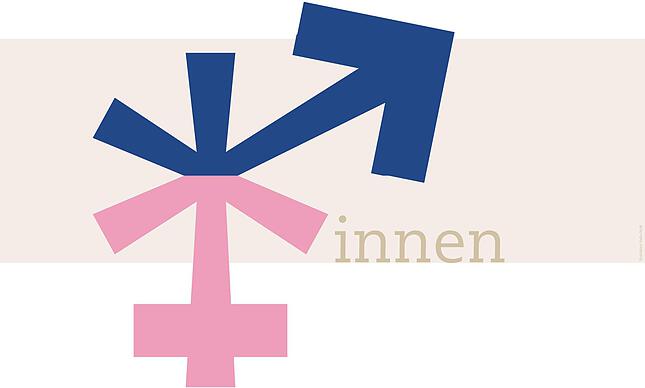March 5, 2021, 5:47 pm
Ottawa Feminist theories once spread to Germany from the Anglo-American language area. Canadian translation scholar Louise von Flotto thinks only half of them have access to everyday life
Races. Louise von Flotto cannot make friends with this word. “In English there is only a noun, and you don’t know it as a verb,” the translation scientist explains. “And because you did not bother to search for a German word for it, the concepts behind it remain strange,” said the professor at the University of Ottawa in Canada.
Not just black or white
The concept behind it – in addition to biological gender there is also a social understanding of roles – introduces the grayscale and shades used by the term “gender-appropriate language” and its reduction to the asterisk known to the “inward” is currently unavailable.
Since the 1970s, von Flotto has been interested in how language can and should bring about social change. Canadian with German roots dealt with feminist literature early on and worked on how to transfer women’s ideas from one language to another.
The differences are not so small …
In the late 1980s and early 1990s, Louise von Flotto was a lecturer in Marburg and Friborg. At that time, she was already able to tell her students about the flaws that women could face in the German academic world.
In Canada, at the time, she was not even permitted to affix a picture to the application to exclude discrimination based on appearance or race. To her surprise in Germany, she even had to say how many children she had.
However, she was the Director of the School of Translation at the University of Ottawa for ten years and is now also a happy grandmother. You still see enough reason to worry about women’s rights.
Some things are blooming
But there are no simple answers from them either. For example, she has little understanding when at the beginning of a conference each participant must declare the pronoun they want to refer to – perhaps using “em,” “ze,” or “thon”? References to gender identities that are no longer limited to males and females. “It got partially ridiculous,” says the 69-year-old.
However, the reverse conclusion that everything must remain the same does not apply. With a language that seeks to deconstruct social power structures, some things will inevitably become more complex. “That’s just how things are.” But she certainly sees differences between literature and everyday language. She doesn’t want to finally answer the question of how far you can and should go in everyday life.
There was not much to change in the English language
Linguistically, the plan that no longer simply “means” the masculine figure leads to distortions in the German and French languages that are not found in the Anglo-American language area. Citizen, Lover, or Friend – There is no feminine form of such terms in English. At best, a few exceptions such as “the president” are contested.
But decades ago, it became commonplace that this no longer meant “everyone should bring their lunch”, but “everyone should bring their lunch.” Thus the topic of “gender sensitive language” in the Anglo-American language area was addressed and emphasized to the general public.
Europe is lagging behind
The idea was exported. In the French-speaking part of Canada, in Quebec, this led many years ago to taking the feminine form into account whenever possible: citizens and citizens. “It’s far from fetched in France,” says Louise von Flotto.
In Germany and other European countries, the debate raged for years, especially in the academic field. Job ads should also be crafted so that they are gender-neutral in that country. Gradually, “citizens” and related phrases leaked into public speeches and political rhetoric. But in newspapers, on radio, in public announcements, the masculine form was considered the norm.
Then came the decision of the Duden editorial team
When a few weeks ago Duden began to clearly distinguish between citizen and citizen, between tenant and tenant, in his electronic version, a storm swept through German offices, press offices and editorial offices, and were intensifying.
Does the heading “Teachers demand Rapid Tests” still apply to all teachers? Or do teachers feel rightly ignored? It is no longer a theoretical question.
Audi is taking a break now
Audi recently announced that a so-called gender gap will be introduced at the company – the bottom mark that should be spoken of as a break.
With Audians, the company also wants to “create a space for all non-binary gender identities”. A dirty storm followed the supposed Internet “gender gaga”. Every decision on this topic carries image risks.
Society is torn apart
Now the major newspapers give space to the topic. Can the spell check dictionary create a language? What are the dangers involved when the masculine formulation applies to men only? What are the consequences of not using gender-sensitive language in a cover letter? Opinions reflect the division of society on the issue.
Luise von Flotow followed the discussion from afar and with increasing alarm. “Some authors are just so disingenuous to me, and some authors are just so tired.” She hopes that linguists will now explain to the general public again and again why it is important to use language and why women should not be called “private members of every community” simply as men.
Are you still in the same place decades later?
She is currently writing a script on “Girls of Igialas”. In this Norwegian novel, the language is constantly feminine. “I laughed in tears when I first read it in German in the 1990s.” While she was working on the English translation, she found it “sad that there are still the same stupid arguments and fights about this.”

“Communicator. Entrepreneur. Introvert. Passionate problem solver. Organizer. Social media ninja.”







More Stories
Boris Becker was jailed for several months in Great Britain, after which he still had to serve part of his sentence.
Great Britain wants to immediately deport asylum seekers without valid documents to Rwanda in the future.
Great Britain wants to increase defense spending to 2.5 percent of GDP